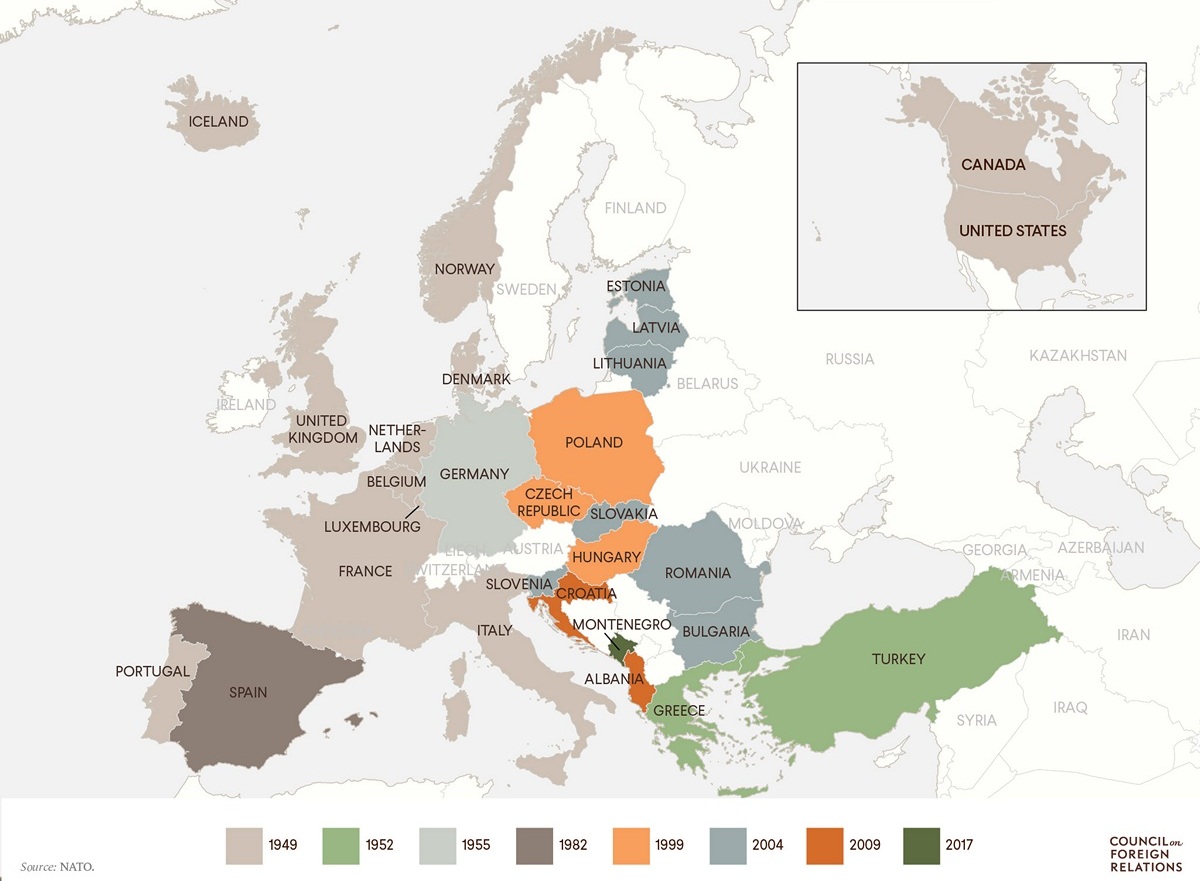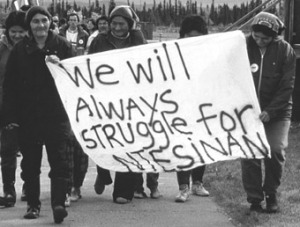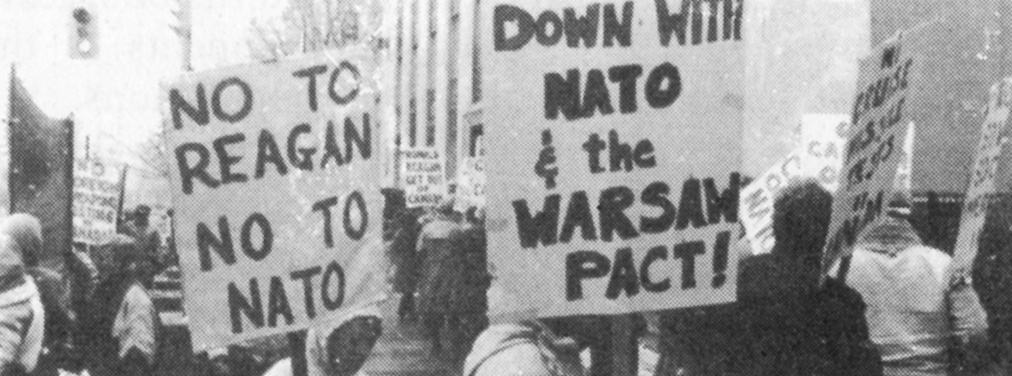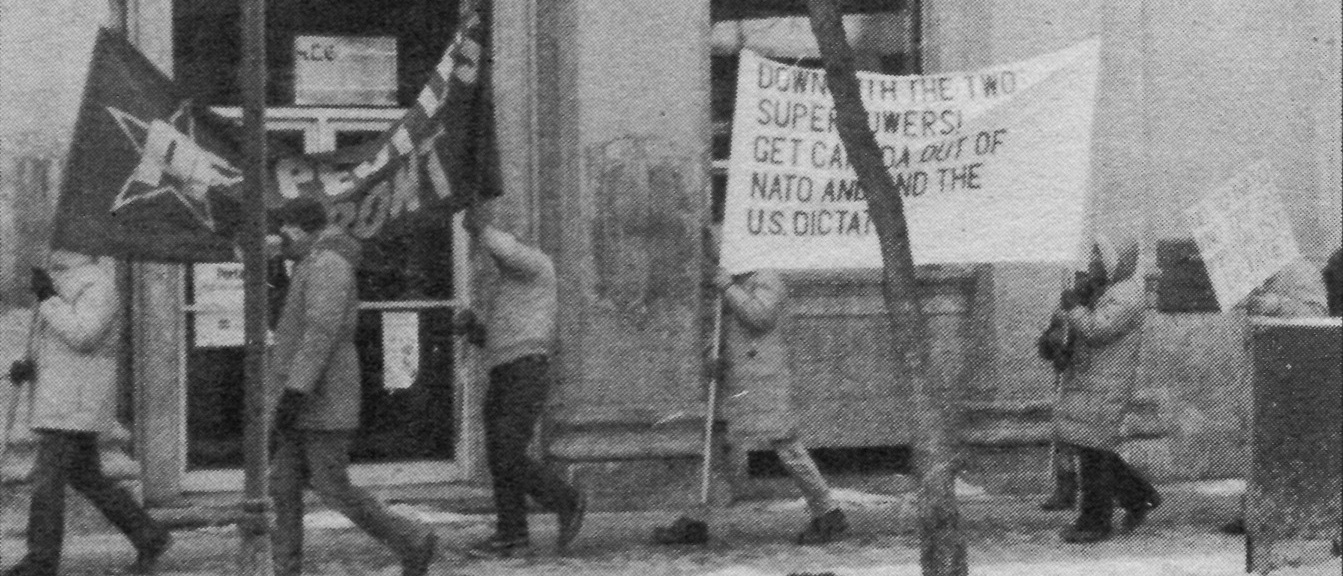|
70th Anniversary of the Founding of NATO No to NATO! Dismantle NATO!
|
|
|
Not only is Canada's membership in NATO an assault on the
people's sovereignty because a foreign power decides all matters related to war and peace on behalf of the people, but even Parliament does not have a say over matters of war and peace because they are matters of executive privilege and/or Royal Prerogative. For example, the United States secretly deployed nuclear bombs in 27 countries and territories during the Cold War, including Canada. The agreements were known only by the Prime Minister and a handful of selected cabinet ministers. On August 28, 1950 -- using the Royal Prerogative -- Prime Minister Louis St. Laurent secretly agreed to the storage of 11 atomic bombs at Goose Bay, Labrador, the closest U.S. nuclear storage site to Europe. According to the secret history of the Security Section of the 43rd Bombardment Wing, cited by Professor John Clearwater in his Canadian Nuclear Weapons: The Untold Story of Canada's Cold War Arsenal, "Units were stored in a forest, on gravel roads, approximately four miles from the base
proper."
Then on August 17, 1963 the Pearson Liberal government agreed to station 500 or more U.S. nuclear warheads in Canada. Professor Clearwater notes that Ottawa said as little as possible about its nuclear weaponry -- partly because of fear that it would be criticized for being part of the Pentagon war machine. The aim was to marginalize the opposition of the Canadian people to the use of Canadian territory for imperialist war preparations, the hosting of U.S. military personnel on Canadian bases and soil, and to the presence of weapons of mass destruction. In other words, the existence of the Royal Prerogative and its use to enforce what cannot be justified is as great a political problem as banning weapons of mass destruction.
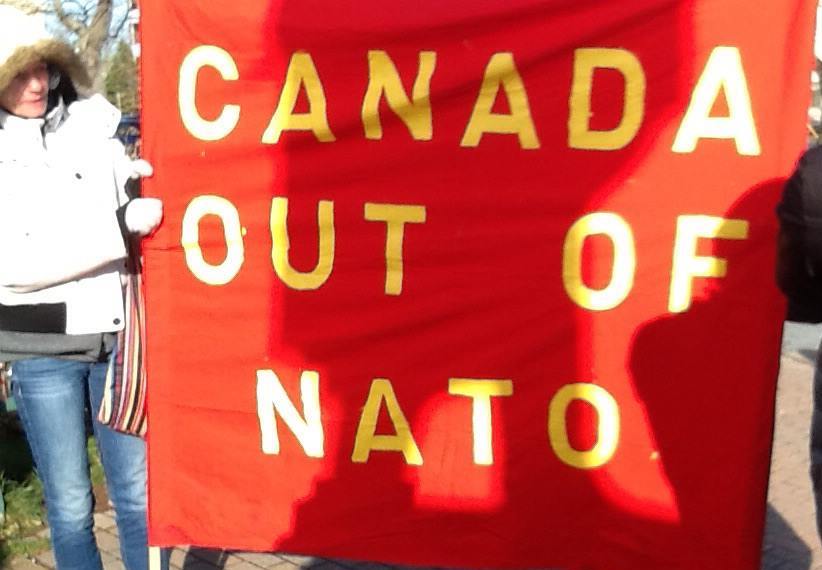 Another front of NATO's aggressive focus today involves
cyber
warfare, information warfare and "election meddling." The changes to the Canada Elections Act contained in Bill C-76 that relate to combatting "foreign influence" and monitoring the use of social media are informed by U.S. National Security Doctrine, NATO and its Atlantic Council think tank as well as the Five Eyes intelligence agencies. These organs represent the interests of trans-Atlantic corporate and financial interests and the foreign policy elite within the United States and Europe. The NATO Association of Canada, for its part, is involved in the
behind-the-scenes changes being made to Canada's electoral system and its electoral laws involving the control and regulation of electoral and political communication. In the name of protecting electors, a form of censorship is introduced to determine what is legitimate. In social media, this affects, for example, those it decrees to be "true believers," i.e. those who, in the words of the intelligence agencies themselves, wittingly or unwittingly become the dupes of Russia, etc., and are thus legitimate targets of persecution. Social media corporations have taken actions against alternative websites known for being critical of U.S. and Canadian government foreign and domestic policies. These include Counterpunch, the World Socialist Website, Global Research, Consortium News, Mediamatters, Common Dreams, Democracy Now, Wikileaks, Truthout, The Intercept, VenezuelaAnalysis, teleSUR and others.
Another front of NATO's aggressive focus today involves
cyber
warfare, information warfare and "election meddling." The changes to the Canada Elections Act contained in Bill C-76 that relate to combatting "foreign influence" and monitoring the use of social media are informed by U.S. National Security Doctrine, NATO and its Atlantic Council think tank as well as the Five Eyes intelligence agencies. These organs represent the interests of trans-Atlantic corporate and financial interests and the foreign policy elite within the United States and Europe. The NATO Association of Canada, for its part, is involved in the
behind-the-scenes changes being made to Canada's electoral system and its electoral laws involving the control and regulation of electoral and political communication. In the name of protecting electors, a form of censorship is introduced to determine what is legitimate. In social media, this affects, for example, those it decrees to be "true believers," i.e. those who, in the words of the intelligence agencies themselves, wittingly or unwittingly become the dupes of Russia, etc., and are thus legitimate targets of persecution. Social media corporations have taken actions against alternative websites known for being critical of U.S. and Canadian government foreign and domestic policies. These include Counterpunch, the World Socialist Website, Global Research, Consortium News, Mediamatters, Common Dreams, Democracy Now, Wikileaks, Truthout, The Intercept, VenezuelaAnalysis, teleSUR and others.
The peoples of the world fight to realize their aspiration for peace every day. All over the world, as they affirm their rights and fight for the rights of all, they translate their desire for peace, freedom and democracy -- hijacked at the time of NATO's founding -- into a political force which puts decision-making in their own hands. Taking up the demand to Make Canada a Zone for Peace is to occupy the space of change. In Canada, the demand to Make Canada a Zone for Peace is aimed, amongst other things, at making sure that Canada's foreign policy does not cause harm to other peoples as is presently the case.
Whether or not NATO survives in its present form, what is certain is that the peoples' striving for peace, freedom and democracy today is favoured by taking up the call to make their countries zones for peace and by uniting in action to establish anti-war governments which express a modern democratic personality which defends the rights of all as a matter of principle.
The strength of the people's striving for peace and the defence of the rights of all cannot be underestimated or downplayed. Attempts to smash this movement and deprive the people of a collective consciousness and action must be opposed. This includes waging the ideological struggle against attempts to portray military interventions abroad as being about "responsibility to protect," "peacemaking" and upholding a rules-based international order and other fairy tales.
The meetings, rallies and articles on the occasion of the 70th anniversary of NATO involve activists and experts from different backgrounds who take principled stands that the existence of NATO is incompatible with the desire of the people for a modern and humane conception of security based on defending the rights of all, for an independent foreign policy based on making Canada a zone for peace, and for nation-building on a modern basis.
On the occasion of the 70th anniversary of the founding of NATO, let us contribute to sorting out the issue of how to take Canada out of NATO and make sure NATO is dismantled. Most importantly, no matter which direction NATO now goes, let us contribute to making Canada a Zone for Peace.
Demonstrations in Canada in the 1960s, 1970s and 1980s
Against NATO and Imperialist War Preparations
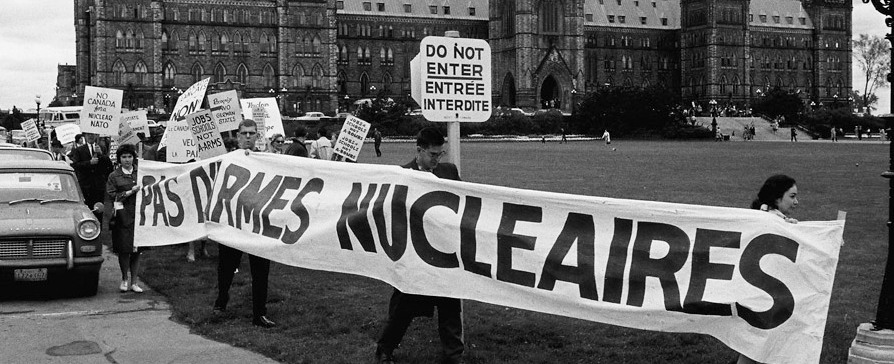
Demonstration outside NATO ministerial meeting in Ottawa in 1963.
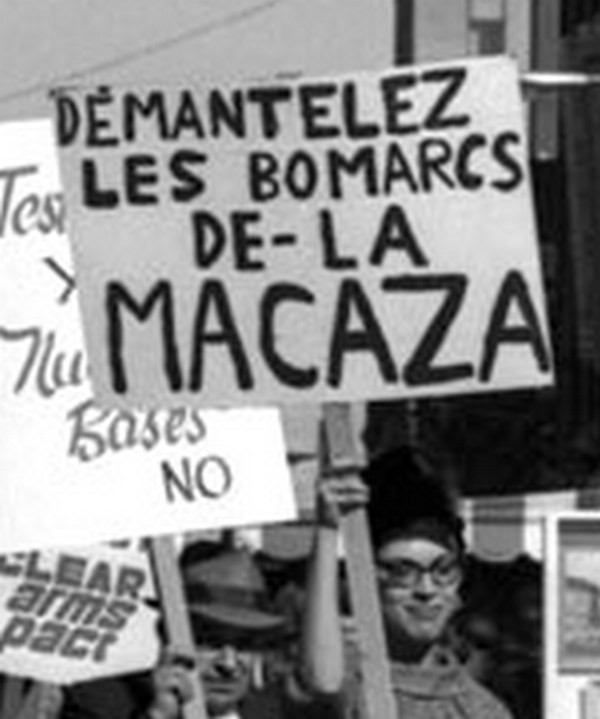
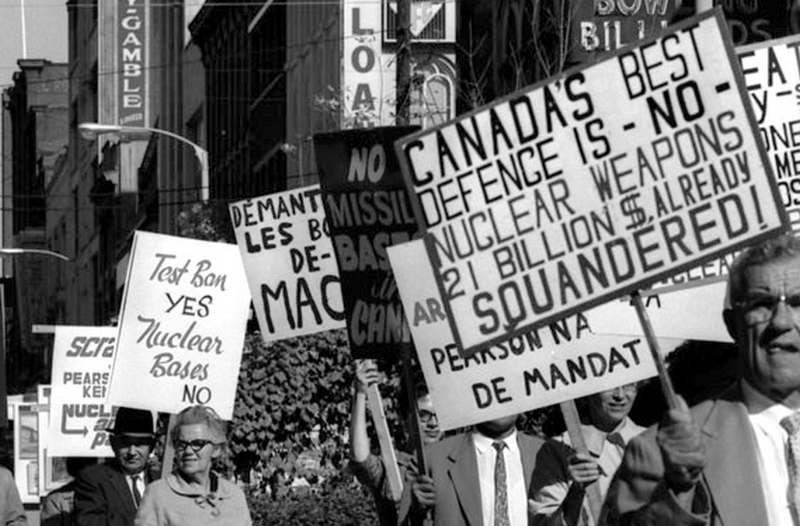
Demonstration on Sparks Street in Ottawa, circa 1963, opposes the Pearson Liberal government's agreement to allow U.S. nuclear missiles on Canadian soil.
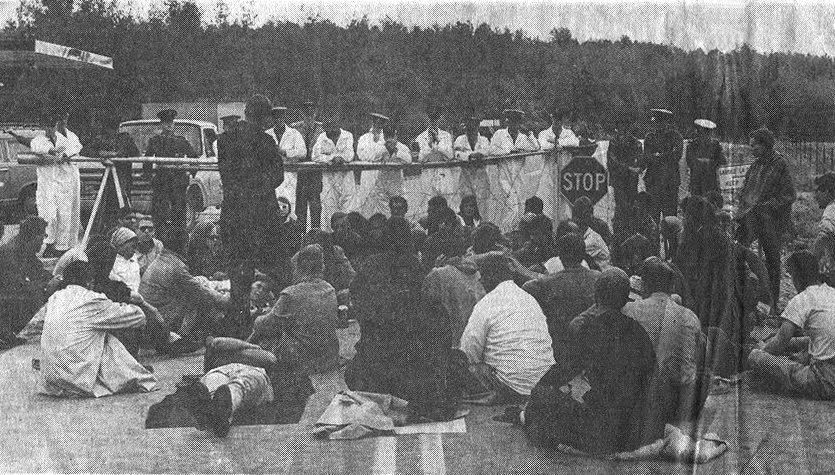
Protestors hold sit-in at the entrance to the Bomarc missile base in
La Macaza, Quebec, September 9, 1964.

Demonstration outside NATO ministerial meeting in Ottawa, 1974.

Demonstration in Vancouver against visiting U.S. warship, July 17, 1982, calls for
Canada to get
out of NATO and NORAD.
Demonstration in Toronto, March 17, 1985 against Reagan's visit. In the mid 1980s actions took place in many cities, organized by CPC(M-L), against imperialist war preparations and U.S. dictate.
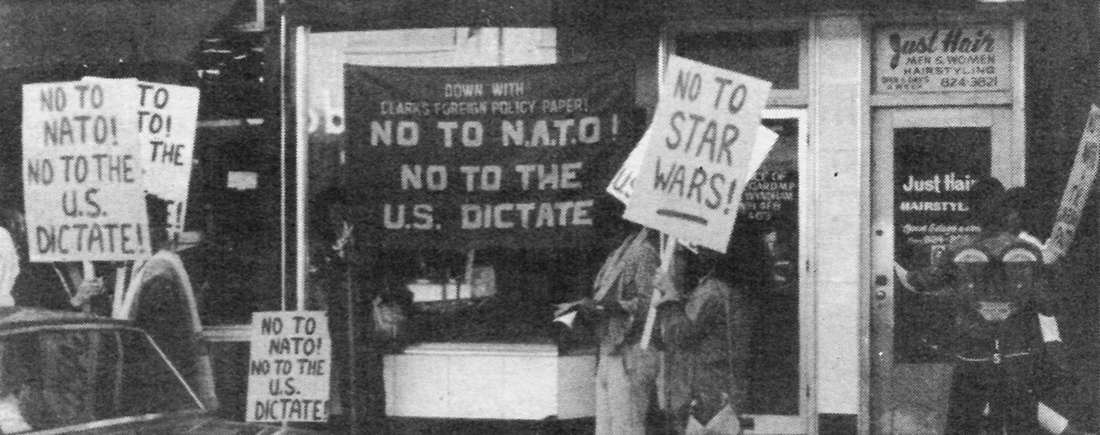
Demonstration in Guelph against Cruise missile testing, June 14, 1985, outside local MP's office.
Demonstration in Winnipeg, January 19, 1988, against Cruise Missile testing in Canada.
Notes
1. "The Alliance's New Strategic Concept," NATO, November 8, 1991.
(TML Weekly, March 30, 2019 - No. 11)
(To access articles individually click on the black headline.)
Website: www.cpcml.ca Email: editor@cpcml.ca
